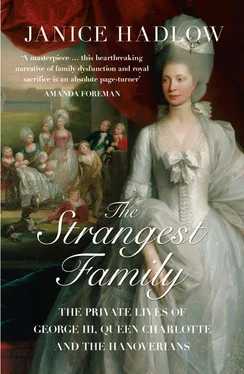When the king first approached him, Munchausen had been able to think of only two princesses who might match his requirements. One, Elizabeth of Brunswick-Wolfenbüttel, was the younger sister of the girl who had been proposed to George as a potential wife by his grandfather several years before, and briskly rejected. Elizabeth was only fourteen, but her youth was only part of the reason George was reluctant to consider her. Her prospects were irrevocably tainted in his eyes by the old king’s attempts to bring about the earlier alliance, and he was obstinately prejudiced against the whole family as a result. Munchausen’s only other immediate candidate was Frederica Louise of Saxe-Gotha. She was nineteen – a suitable age – and Munchausen had heard many good things about her; however, he felt constrained to add that, like her mother, she was reputed to be very interested in philosophy. George replied with some vehemence that this description made the princess repugnant to him from every point of view. 9He added that he was not at all discouraged by the shortcomings of these first contenders, assuring Munchausen that, perhaps as a result of his study of the New Berlin Almanack , he knew there were many other princesses to consider.
Bute later presented Munchausen with a list, drawn up in George’s handwriting, of the marriageable princesses who had caught his eye. Armed with these names, Munchausen was directed to begin the search in earnest. He was told to ask his brother, chief minister in Hanover, to make discreet enquiries about the character and disposition of all the women on the list. Bute emphasised that speed was of the essence. The king wanted the matter resolved as soon as possible, and so, for his own reasons, did Bute. He had seen how severely Sarah Lennox had tried George’s determination not to involve himself with women, and understood that marriage could be delayed no longer. Both he and Augusta had done all they could to instil in the young man a deep-seated conviction that it was one of his most important duties to avoid entanglements with designing females, and, responsive as he always was to the pull of obligation, George had so far complied; but both anticipated with apprehension the possible advent of a mistress, with her own agenda to pursue and her own relatives to advance. A lover was thus far more to be feared than a wife, and it was not surprising that Bute confided to Munchausen that he could not be happy until he saw the young king happily married. He dreaded the danger of his being led astray, he told the minister, out of the good way in which he had been at such pains to keep him. 10
Munchausen’s brother, himself an experienced politician, responded immediately to the sense of urgency communicated by both George and Bute and sent back a report containing his initial findings on the front-runners. Frederica of Saxe-Gotha, whose philosophical interests had so dismayed the king, was firmly dismissed: Munchausen had heard she was scarred by smallpox; he confided privately to his brother that she was rumoured to be deformed. More promising was Philippa of Schwedt, sixteen years old and a niece of Frederick the Great. Caroline of Darmstadt was considered to be worth further investigation. Munchausen was keen to keep Elizabeth of Brunswick-Wolfenbüttel as a possibility, despite discouraging signals from the king. She was reputed to be very beautiful. It was true she was young, but Munchausen insisted she was very well developed for her age, although he admitted it might require a proper medical opinion to determine her potential childbearing capacity. 11
Almost as an afterthought, Munchausen added an idea of his own: Sophia Charlotte, of the tiny duchy of Mecklenburg-Strelitz, looked promising. He had heard she was quiet, unassuming, of unimpeachable respectability, and was said to have been very properly educated by her mother, ‘ une princesse d’un esprit solide ’. He undertook to find out more about all the princesses, preferably from those who had actually met them, and, if possible, from an Englishman, who might be expected to have a better understanding of the king’s taste. His own preference was for the Princesses of Brunswick and Schwedt; he doubted whether any of the others had been brought up in circumstances of sufficient grandeur to prepare them for the role of Queen of England. 12George and Bute did not entirely agree. Having read Munchausen’s report, they instructed him to concentrate on the Princesses of Schwedt, Darmstadt and Mecklenburg-Strelitz, and to consider the Brunswick princess only if all other options failed. Bute told Munchausen her youth counted against her, but Munchausen believed it was the continued association of her family with George II’s wishes that had set the king’s mind against her. George, it seemed, and as he declared, was determined not to be ‘be-Wolfenbüttled’.
It took Munchausen some weeks to complete the next stage of his enquiries, and it was not until January 1761 that a detailed report arrived in London. It put an end to the chances of Philippa of Schwedt. Although she was said to be handsome, it also described her as ‘ d’une humeur opiniatre et peu prévenante ’: ‘stubborn’ and ‘inconsiderate’ were not words George wanted to hear used about a prospective wife, and her name disappeared from his thinking. ‘I am under the greatest obligation to your brother,’ he told Munchausen. ‘What would I have risked if I had not hit upon so honest a man. I now abandon the idea.’ That left only the Princesses of Mecklenburg-Strelitz and Darmstadt. Charlotte of Mecklenburg-Strelitz was said to have a very good character, but Munchausen was still anxious that, having been raised in a very small, undistinguished court, she was too provincial to be seriously considered. The king’s own preference, at this point, was for Caroline of Darmstadt; if further reports on her were favourable, he confided to Bute that she would be his choice. Meanwhile, he continued to urge haste on everyone concerned. ‘The king’s longing and impatience increase daily,’ Munchausen told his brother, ‘and he has today calculated how long it will take for this letter to reach mon cher frère and for him to send an answer.’ 13
When the much-awaited dispatch arrived, it was a great disappointment. It had little positive to say about Caroline’s character, asserting that her own mother had described her ‘as stubborn and ill-tempered to the greatest degree’. The same report was, however, far more encouraging about the other candidate, ‘giving a very amiable character of the Princess of Strelitz’. George was encouraged, insisting that he did not share Munchausen’s anxieties about the limitations of her upbringing. It was her character that mattered to him, not her background. He told Bute that if she was as sensible as was reported, ‘a little of England’s air will soon give her the deportment necessary for a British queen’. 14
The relaxed jocularity of George’s tone defined the attitude with which he set about the prosecution of what he called ‘my business’. Indeed, as the search for a spouse progressed, there is a definite sense in his correspondence that he was rather enjoying it. For such a timid and inexperienced man, the prospect of making an unhindered choice from a parade of marriageable young women, none of whom was likely to reject him, was clearly an attractive one. In the role of prospective husband, he found a new confidence, secure in his worth and in the power of his position. He had no difficulty in outlining the qualities necessary to satisfy him, nor in rejecting candidates who failed to live up to his very exacting requirements. As a spouse, he intended to be an altogether more assertive character than he had been as a son. In finding the partner he thought he deserved, he showed himself capable of making decisions with none of the anxiety or lethargy that had paralysed his actions in earlier life. This was an enterprise in which George did not intend to fail.
Читать дальше












